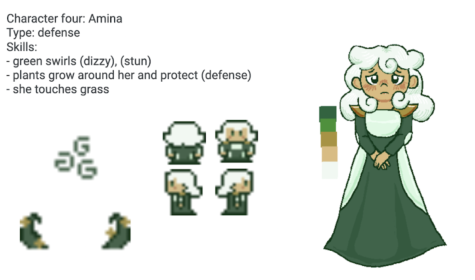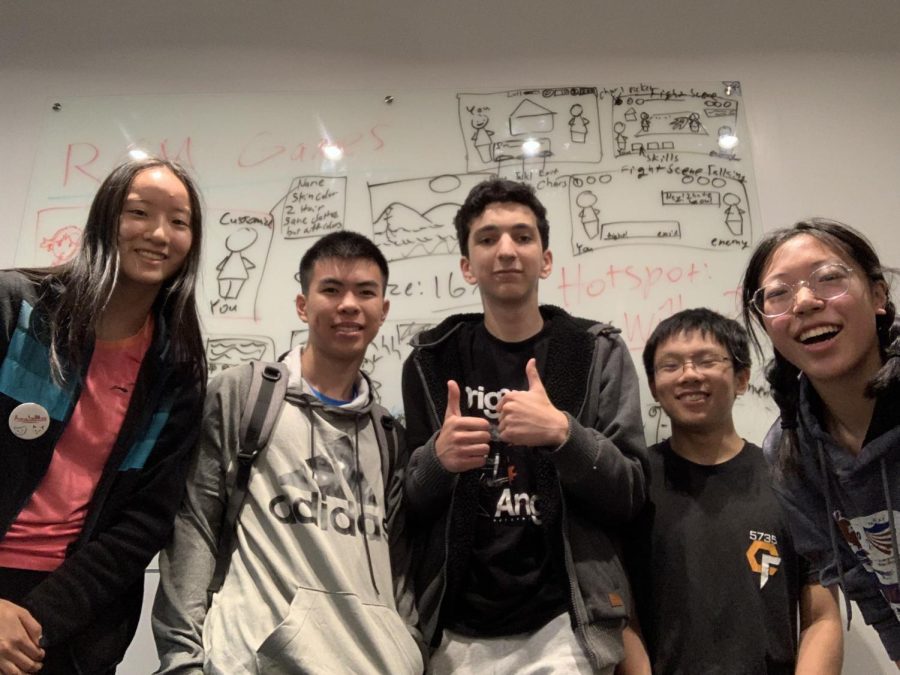Competitive coding: WHS team wins big
Credit: Courtesy of Charmaine Guo
Juniors (left to right) Annabelle Zhang, Raymond Xu, Ari Zuckerman, Justin Cai and Charmaine Guo pose in front of a concept design for their video game they created at the Angel Hacks 3.0 competition. The team won the prize “Most Likely to Cause Players Financial Ruin” at the competition on May 27 and 28.
June 8, 2023
According to junior Ari Zuckerman, kids sitting in front of a screen for 24 hours with small breaks might seem like some parents’ worst nightmare. However, Zuckerman and juniors Annabelle Zhang, Charmaine Guo, Raymond Xu and Justin Cai did just that. Starting at 10:00 a.m. on Saturday, May 27, the team of juniors competed in a 24-hour “hackathon” called AngelHacks 3.0 which they won a category in.
The national student coding organization, Hack Club, ran the AngelHacks event in Boston. Zhang, Zuckerman, Guo, Xu and Cai spent nearly a whole day brainstorming, designing and coding a video game (link to play) called “Personality,” which they describe as loosely inspired by Pokémon.
“We didn’t start [planning] ahead of time because we were waiting for the theme,” Zhang said. “We realized pretty quickly that there was no theme because [the moderators] didn’t want to limit our creativity.”
The freedom each team had over their designs resulted in a diverse range of games. While the WHS team’s concept was about different characters defending a town from mobs, other teams designed everything from RPGs to rubber duck tower defense games.
“Some people there were overachievers trying to relax for a weekend by making a game,” Zuckerman said. “I thought that was pretty cool.”
Each member of the WHS team played a different role in making the game. Zuckerman, Xu and Cai spent most of the competition coding the actual game, while Zhang was responsible for the art. Guo was responsible for creating the storyline and some of the background art.
“You don’t need to know anything fancy,” Zhang said. “It’s okay to go to a beginner level event that you think you’re not qualified for because there will be instructors that are there to help you. That’s their entire purpose.”
Due to the time constraints and that some participants were beginners, almost none of the games were complete by the end of the competition. According to Zuckerman, because the WHS team went for an ambitious concept, they didn’t have many fully functional features by the end of the 24 hour time limit.
“Basically all we had was the title card and then the opening scene where you just walk around the town for a bit,” Zhang said. You could trigger a fight scene, and, if you got lucky, you’d only get two errors in the code and you could fight. But if you were unlucky, you got four errors in the code and you’d have to restart the game.”
Despite their game not functioning, the team believes it was their ambitious concept that won them the category “Most Likely to Cause Players Financial Ruin.” To vote, the moderators gave every participant some stickers to put on their favorite games, and the teams with the most stickers won. During the voting process, the WHS team emphasized the part of their game where you could bid money for different characters, and utilized their diverse concept art to draw voters’ attention.
“I think people really liked our presentation because they were laughing a lot, especially when I was introducing each individual character and I explained that each ultimate ability had no actual impact on the game,” Zhang said. “Amina, one of the characters we created, for example, would touch grass as her ultimate ability.”

The winners were decided based on votes from other competitors and each WHS team member received a Nintendo Switch Lite as a prize for their category. Other prize categories included “Uniquely Useless,” which gave winners a year’s supply of ramen noodles, and “Poignantly Pointful,” which gave winners swords.
According to Zhang, although designing and coding a game over the course of 24 hours was difficult, she enjoyed learning new skills and spending time with her teammates. Although Zhang and the WHS team didn’t go into the competition expecting to win, they are happy about the hard work they put into it because it paid off.
“It was fun to go to a hackathon and step out of my comfort zone,” Guo said. “Now, I know all these people who can do different things and I can rely on them to go with me to another [hackathon] in the future.”





![Last Wednesday, the Wayland School Committee gathered to discuss a number of topics regarding the health curriculum and Innovation Career Pathway course. Another large topic of conversation was the ways to potentially mitigate distracting cell phone usage. "These [phones] are going to distract your learning and social relationships," Superintendent David Fleishman said. "That's concrete right there."](https://waylandstudentpress.com/wp-content/uploads/2025/06/Screenshot-2025-06-04-at-9.49.31 PM-1200x886.png)



























![Troy Hoyt finishes the Boston Marathon, running for the Hoyt Foundation. T. Hoyt is the son of Hoyt Foundation CEO Russ Hoyt.
“[Running a marathon] might seem like a big thing, when it’s presented to you at first, but if you break it up and just keep telling yourself, “Yes, you can,” you can start chipping away at it. And before you know it, you’ll be running the whole 26 miles, and you won’t even think twice about it.” T. Hoyt said.](https://waylandstudentpress.com/wp-content/uploads/2025/04/C36E8761-1CBB-452E-9DF2-543EF7B1095E_1_105_c.jpeg)













































